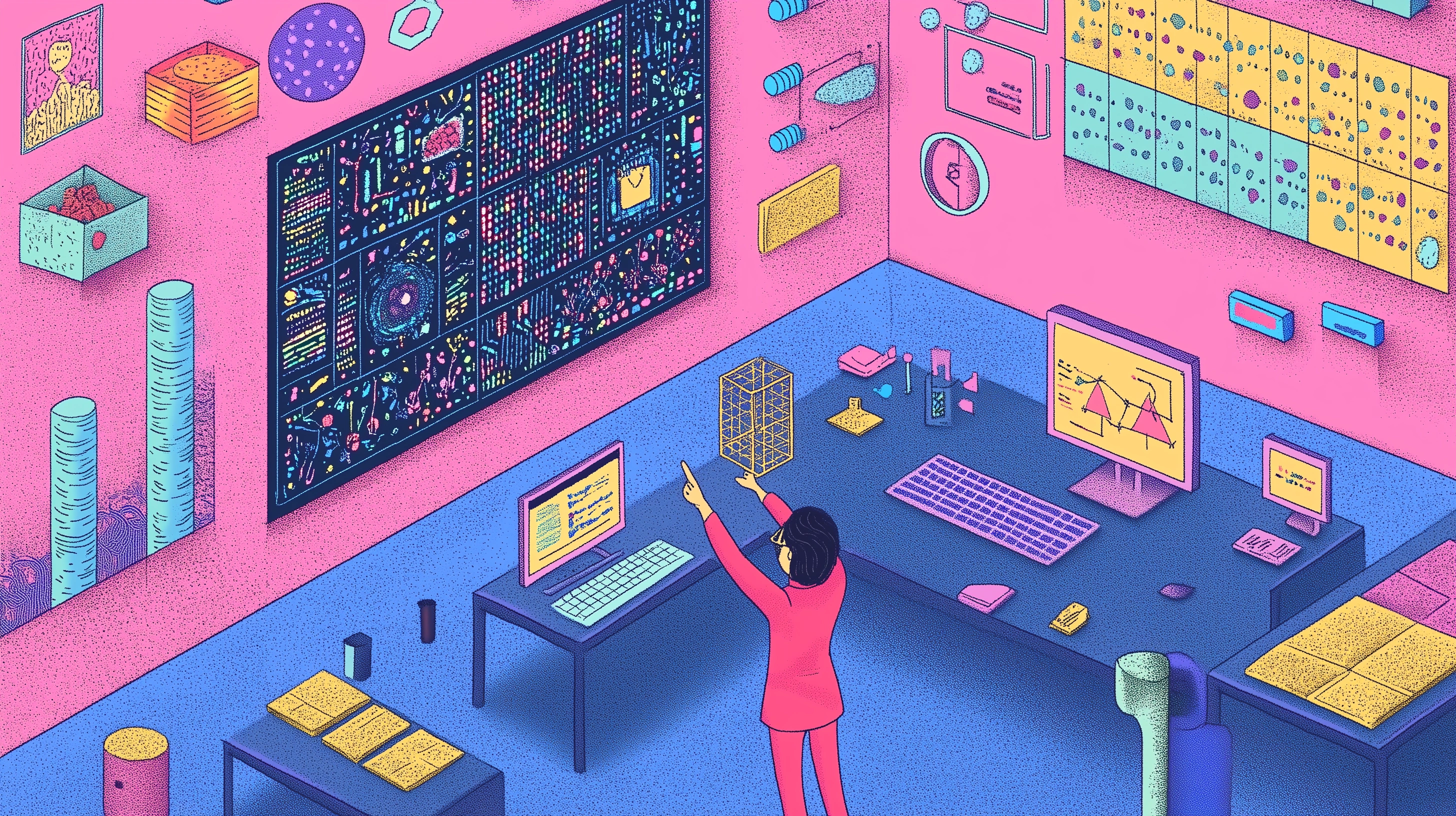Enterprise software solutions are a messy game, we can do better

The world of enterprise product innovation is stuck in an impasse created by risk averse bureaucracy and greed.
Navigating the messy enterprise product landscape and how to do things better
The world of enterprise product innovation is stuck in an impasse created by risk averse bureaucracy and greed. In this difficult landscape, there are only a few product studios who are able to navigate, redefining the paradigms that once governed enterprise tech products.It's time to innovate, adapt, and align with the future.
Gradually, then suddenly: The shift in the enterprise tech products
Traditionally, large software vendors dominated the corporate digital ecosystem. Their massive solutions, once deemed revolutionary, have now become cumbersome in the agile age of tech. However, as Bob Dylan rightly sang, "The times they are a-changin'." A new breed of product studios, with Eli5 at the helm, are reshaping the narrative. These studios are agile, adaptable, and deeply rooted in a startup mindset. Where larger vendors relied on scale, product studios leverage efficiency, speed, and a deep understanding of modern user needs. Yet, to appreciate this transition, it’s essential to delve into the perennial debate that has dominated enterprise product discourse for years.
Off-the-shelf vs. bespoke solutions: The great divide
Enterprises, for years, have swayed between off-the-shelf and bespoke digital solutions. On one hand, ready-made solutions promise quick deployment and perceived cost savings. Yet, beneath this facade of convenience lies a hard truth, many of these solutions mask inefficiencies, stifle innovation, and often lead to longer adaptation cycles due to their generic nature. Conversely, bespoke solutions, tailor-made to cater to specific organizational needs, offer precision. Every feature and every line of code serves a purpose. However, this customization comes with its challenges, primarily the extensive time and resources needed to do things right. In this deadlock between convenience and customization, many enterprises find themselves in a pickle. The dilemma intensifies when considering the underlying motivations behind each choice. For many corporations, opting for off-the-shelf products often stems from a desire to offload responsibility. It's a safety net, protecting them from the complexities and challenges of software development. On the flip side, bespoke solutions, while offering unmatched fit and functionality, demand significant investment. Companies are often attracted to the idea of owning their software and making sure it fits their specific business needs perfectly. But the prolonged development timelines can be a deterrent, especially in sectors where agility is the game-changer.
Bridging the divide with a hybrid approach
At Eli5 we’ve been applying our own approach to enterprise product development. Rooted in the philosophy of combining the best of both worlds, this approach is made to redefine enterprise software solutions. Drawing from our vast experience across industries, from Fortune 500 giants to vibrant startups, we've identified common denominators in tech products. Beneath the numerous features and functionalities, many products share foundational elements, reflecting similar underlying principles. Recognizing this, we have built Eli5 Building Blocks over the last years. These are adaptable, efficient modules, designed to expedite backend development without compromising on quality. Think of them as the robust backbone, but tailored to unique business needs. By standardizing these common elements, we not only optimize development time but also ensure that each module is tried, tested, and perfected over multiple iterations.

The power of Eli5 Building Blocks
However, Eli5 Building Blocks isn’t just about time efficiency; it's a philosophy that emphasizes quality without compromise. By offloading the repetitive aspects of development to these standardized blocks, teams can focus on what truly matters: crafting the very best user experiences, designing intuitive interfaces, and ensuring every interaction aligns seamlessly with end-user expectations. But let's explain this a bit further. Imagine constructing a building. The foundation, the pillars, and many internal structures remain the same across different buildings. But what differentiates one building from another is its design, its exterior, the unique elements that lend it character. The Eli5 Building Blocks act as those foundational elements, robust and reliable, while the bespoke development conveys that unique identity and product logic, fully tailored to resonate with its users.
Prioritizing user experience in the digital age
In today's digital landscape, a well thought through user experience is essential. With an abundance of options at their fingertips, users no longer have the patience for subpar interfaces or cumbersome navigation. Every interaction, every design element contributes to the user journey, dictating whether they stay engaged or seek alternatives. Recognizing this, Eli5, as a forward-thinking Product Studio, places user experience at the heart of its development ethos. Our approach transcends mere aesthetics; it delves deep into understanding user behavior, preferences, and pain points. While the backend, partly powered by Eli5 Building Blocks, ensures flawless functionality, our frontend engineers ensure users love the interaction with the product.
The intellectual property dilemma
In enterprise software, IP often emerges as a source of disagreement. Traditional software development models, centered around IP ownership, pose challenges, especially in a world where collaborative innovation is becoming the norm. Is owning every line of code truly beneficial? Or does it just stifle agility and adaptability? With the hybrid approach, Eli5 offers a balanced perspective. While standardized backend modules might remain a shared resource, the bespoke frontend, tailored uniquely for a client, can be structured with IP arrangements that favor the client. This ensures that while clients benefit from robust, tested backend modules, they still retain a sense of ownership and uniqueness in the elements that truly differentiate their product in the market. Moreover, these backend Building Blocks, given their standardized nature, come with a high level of reliability. Clients can rest easy, knowing that these modules, perfected overtime and battle tested, are not only efficient but also reliable, minimizing unforeseen glitches or operational challenges.
.webp)
Challenging the traditional mindsets
The digital landscape is evolving, and with it, so must our approaches. The era where enterprises sought safety in off-the-shelf solutions, or poured resources into entirely bespoke developments, is giving way to a more balanced, thoughtful era. An era where agility doesn't come at the cost of quality, and customization doesn't translate to prolonged development cycles. At Eli5, we envision a future where digital solutions are not just about codes and modules; they are about crafting experiences, nurturing engagements, and building products that resonate. It's not just about development; it's about envisioning, strategizing, and then meticulously bringing that vision to life. This mindset shift – from mere development to holistic product creation – is what differentiates a Product Studio like Eli5 from conventional software agencies.
A paradigm shift in digital innovation
As the realm of tech products becomes increasingly crowded, the difference between a good product and a great one can boil down to the smallest details. It's not just about launching a functional product anymore; it's about launching a product that speaks to its audience, that solves a genuine problem people care about, and that offers an unparalleled user experience.Larger corporations, with their vast resources and deeper pockets, often find themselves entangled in bureaucracy and risk aversion. This not only slows down the pace of innovation but also impedes the agility required to adapt in an ever changing environment. On the contrary, startups, unburdened by legacy processes, move ahead, launching products that users gravitate towards. However, this doesn’t mean that larger corporations are at a disadvantage. It merely underscores the importance of embracing a fresh mindset – one that prioritizes agility, innovation, and user-centricity. By leveraging the power of hybrid software development, where Eli5 Building Blocks can play an important role, corporations can marry the best of both worlds: the robustness of standardized modules and the uniqueness of bespoke development.
The ethos of value creation
The true essence lies in solving genuine problems, in creating tangible value. Agencies that remain entangled in short-term financial gains, that prioritize fancy new technologies and sales over genuine problem-solving, risk becoming obsolete. It’s necessary, now more than ever, to move focus from ‘how we build it’ to ‘why we build it’. Every tech product should stem from a genuine need, a real-world problem that a specific group of people needs to have solved. And every stage of its development, from conceptualization to deployment, should be led by this overarching objective. As a Product Studio, our focus isn’t just on engineering; it’s on ideation, strategy, and ultimately, value creation. Each product, powered by the efficiency of Eli5 Building Blocks, is built to resonate with its target audience, ensuring it doesn't just meet but exceeds expectations.
The future of product building
In a world driven by digital innovation, the rules of the game are continually evolving. Traditional software development models, while still relevant, need to adapt to the demands of modern users. The shift towards a hybrid development approach, embodied by Eli5’s Building Blocks, signals a new approach to building products – an era where efficiency meets uniqueness, where standardization complements customization. The road ahead, for corporations and agencies alike, is clear. Embrace agility, foster innovation, and prioritize value creation. In this winner-takes-all digital age, the path to success lies in constantly evolving, adapting, and staying ahead of the curve.
.webp)




.png)

.jpg)






.webp)






%20(1).png)







.webp)
.webp)


